Monthly Archives: September 2015
Here are examples of materials we tested this month:
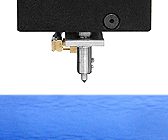
Mechanical:
• Nanoindentation & scratch of thin teflon films
• Nanoindentation & Macro scratch of DLC coatings
• Microindentation ultimate tensile strength on various nickel alloys
• Micro scratch test of bio coatings
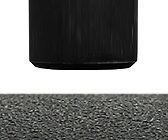
3D Non-Contact Profilometry:
• Roughness of precision machined components
• Texture of textile samples
• Coplanarity of ball grid arrays
• Volume loss of dental samples
• Flatness measurement of micro seals
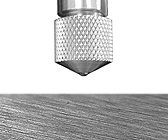
Tribology:
• Wear resistance of hard polymers
• Wear resistance of firearm parts
• High temperature fretting of engine parts
• Stribeck Curve of lubricants
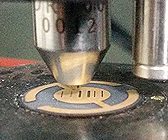
Gold Coating Adhesion on Quartz Crystal Substrate
As an extremely accurate device, the Quartz Crystal Microbalance (QCM) measures the mass change down to 0.1 nanogram. Any mass loss or delamination of the electrodes on the quartz plate will be detected by the quartz crystal and cause significant measurement errors. As a result, the intrinsic quality of the electrode gold coating and the interfacial integrity of the coating/substrate system play an essential role in performing accurate and repeatable mass measurement. The Micro scratch test is a widely used comparative measurement to evaluate the relative cohesion or adhesion properties of coatings based on comparison of the critical loads at which failures appear. It is a superior tool for reliable quality control of QCMs.
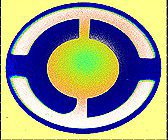
Surface Finish of Quartz Crystal Microbalance
Reliable quality control heavily relies upon accurate, quantifiable and reproducible surface inspection. Flatness & finish of the Quartz Crystal Microbalance (QCM) surface are vital to its accuracy and both measurements in 3D guarantees proper manufacture processing and control measures. Unlike a touch probe technique, the Nanovea Profilometer performs a 3D non-contact surface measurement of the sample. This eliminates the risk of creating micro scratches on the QCM surface that may cause inaccuracy or errors in the mass measurement.
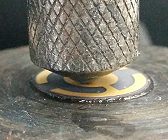
Coating Tribology of Gold on Quartz Crystal Substrate
The QCM works based on the piezoelectric properties of the quartz crystal. It measures the mass change on the surface down to 0.1 nanogram during material deposition by detecting variations in the resonance frequency of the crystal. Due to the extreme sensitive and accurate characteristics of the QCM, it is critical to ensure that the two electrodes on both sides of the quartz plate possess good wear resistance. Any mass loss on the metal electrodes caused by wear can lead to significant error in the measurement. Therefore, reliable and accurate wear evaluation using a Tribometer is important for quality control and R&D of QCMs.









